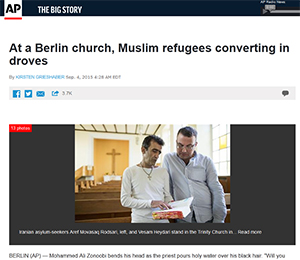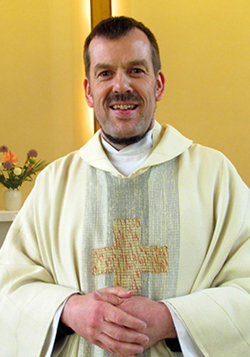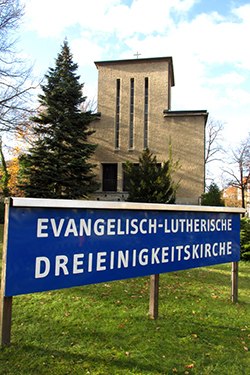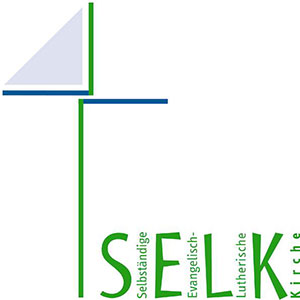
The Associated Press story on Muslims converting to Christianity in Germany. (Screen grab).
GERMANY – The Independent Evangelical Lutheran Church (SELK) of Germany has drawn international media attention recently as a result of the large number of Iranian and Afghan converts their congregations have received into fellowship in recent years.
Over the past decade, Germany has seen an unprecedented amount of Iranian and Afghan refugees converting to Christianity. For many of these converts, Rev. Dr. Gottfried Martens has been the pastor who shepherded them through the process. A recent Associated Press article features his work among refugees, beginning with a recent baptism service he conducted. “Will you break away from Satan and his evil deeds?” the pastor asks an Iranian named Mohammed Ali Zonoobi, and “Will you break away from Islam?” The candidate answers yes to these and other questions, and Dr. Martens baptizes him in the name of the Father, Son, and Holy Spirit.

Rev. Dr. Gottfried Martens. (Church website).
Dr. Martens is pastor of Trinity Lutheran Church in Berlin, a congregation which has exploded in size due to the dramatic number of Iranian and Afghan converts joining the church. In two years, the church has grown from 150 members to more than 600, with more than 500 of these members being Farsi and Dari speakers. Prior to joining Trinity Lutheran, Dr. Martens served at St. Mary’s Lutheran Church, also in Berlin—a congregation that had, as of early 2014, seen congregational membership and the number of baptismal candidates of Iranian descent grow by 75%.
Dr. Martens’ work among Iranian converts was previously featured in a 2012 Christianity Today article, and he was named 2012’s “Pastor of the Year” by the German magazine ideaSpektrum for the same reason. In 2014, the United Kingdom’s The Guardian also featured his work in an article entitled “Our second mother: Iran’s converted Christians find sanctuary in Germany.”
“These refugees are taking unimaginable risks to live their Christian faith,” Dr. Martens said in the Christianity Today article at the time. “Imagine! Of all places, God chooses eastern Germany, one of the world’s most godless regions, as the stage for a spiritual awakening among Persians.” Persians is another term for Iranians.
Of course, some have questioned the authenticity of these widespread conversions, suggesting a more pragmatic reason for the number of Iranians and Afghans professing faith in Christ. The Associated Press article, for example, hints that “the decision [to convert] will also greatly boost their chances of winning asylum by allowing them to claim they would face persecution if sent home.” In places like Iran and Afghanistan, converting to Christianity from Islam is a punishable offense that can lead to imprisonment, torture, or even execution.
But for Zonoobi and others like him, that threat existed long before they left Iran. Zonoobi converted to Christianity as a teenager while still living in Iran, and fled to Germany only after Christian friends began to be arrested for their faith. The total number of Christian converts in Iran is difficult to pinpoint but is widely understood to be growing. “The proselytizing from Muslim-to-Christian converts in the Diaspora as well as Christian neighbors closer to home has led to the religion taking hold throughout Iran in numbers previously unseen,” The Guardian’s 2014 report suggests. “The underground nature of the Christian conversion movement has made numbers impossible to determine accurately,” they note, but estimates of the Christian population in Iran range anywhere from 300,000 to 500,000.

Trinity Lutheran Church in Berlin. (Church website).
Perhaps some Iranians and Afghans in Germany are joining Trinity Lutheran and other churches merely in an attempt to increase their chances of a successful refugee claim. But Dr. Martens has confidence in God to work through the Word and the Sacraments even then. “I know that whoever comes here will not be left unchanged,” he says in the Associated Press report. And the numbers bear his confidence out—Dr. Martens estimates that roughly 90% of those baptized have remained members of the church.
And there are plenty more waiting in the wings for their baptismal day. At least 80 more Iranians and Afghans are reportedly working towards their own baptisms at Trinity Lutheran, an event that is first preceded by three months of instruction in the Christian faith. If recent history is anything to go by, a new class of converts will be ready to take their place shortly thereafter.
The Independent Evangelical Lutheran Church of Germany is a member of the International Lutheran Council, a worldwide association of confessional Lutheran church bodies.
———————

 GERMANY – The Independent Evangelical Lutheran Church (SELK) continues to see remarkable numbers of Iranian Muslims converting to Christianity. According to a recent SELKinfo story, Rev. Dr. Gottfried Martens of St. Mary’s Lutheran Church (Steglitz, Berlin) reports that the number of congregational members and applicants for baptism of Persian background at his church has recently grown by 75%. The same report notes three groups of Iranians were preparing for baptism at the time, with the first group scheduled to have been baptized December 15, 2013.
GERMANY – The Independent Evangelical Lutheran Church (SELK) continues to see remarkable numbers of Iranian Muslims converting to Christianity. According to a recent SELKinfo story, Rev. Dr. Gottfried Martens of St. Mary’s Lutheran Church (Steglitz, Berlin) reports that the number of congregational members and applicants for baptism of Persian background at his church has recently grown by 75%. The same report notes three groups of Iranians were preparing for baptism at the time, with the first group scheduled to have been baptized December 15, 2013.